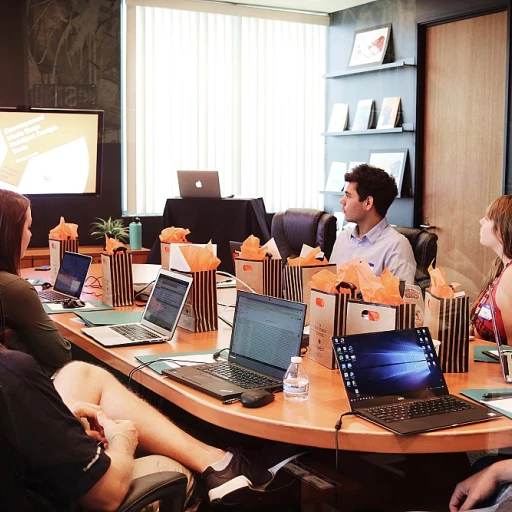
Understanding Intrinsic Career Motivation
Importance of Understanding the Root of Intrinsic Motivation
In any thriving business environment, the concept of intrinsic motivation plays a vital role. It refers to the drive that comes from within an individual to pursue career goals without the primary influence of external rewards. Whether we're talking about a software engineer in Mountain View or a marketing professional aiming to excel in product marketing, understanding the depth of intrinsic motivation is essential for personal and professional growth.
Intrinsic career motivation leads to higher job satisfaction, fueling individuals to push beyond the confines of an ordinary work environment. In contrast to extrinsic motivators, such as salaries or bonuses, intrinsic motivation is influenced by personal interest, a sense of challenge, and the pursuit of meaningful work. It’s an invaluable asset in a world increasingly focused on innovation and high performance.
Companies that excel in fostering intrinsic motivation often see a marked improvement in overall performance. When a company prioritizes understanding the intrinsic career motivations of its employees, it helps create more tailored role expectations and growth pathways, thus supporting long-term engagement.
Being familiar with intrinsic and extrinsic motivation can reveal the reasons behind a team's dynamics and drive. While everyone's path varies, finding the balance between intrinsic and extrinsic elements can yield a more fulfilled and motivated workforce.
Professionals equipped with years of experience and an intrinsic drive tend to adapt well to evolving business landscapes, often leading others in their organizations. Understanding and nurturing this intrinsic drive not only boosts current job performance but also aligns with strategic goals that benefit both individuals and businesses in the long run.
For those interested in learning more about developing effective career goal frameworks that align with intrinsic motivations, you can explore the insights in this resource.
The Role of Corporate Culture in Fostering Intrinsic Motivation
The Influence of Work Environment on Employee Motivation
Corporate culture plays a pivotal role in nurturing intrinsic career motivation within a business setting. When aligned with the intrinsic goals of individuals, corporate culture can significantly enhance job satisfaction and drive high performance across various teams. Understanding the importance of this alignment allows companies to foster a work environment where intrinsic motivation thrives, leading to positive outcomes.
Fostering intrinsic motivation begins with recognizing the differences between intrinsic and extrinsic motivators. While extrinsic motivation relies on external rewards such as bonuses or promotions, intrinsic motivation is fueled by internal factors like personal growth, a sense of accomplishment, and alignment with career goals. Creating a company culture that values these internal motivators can elevate overall job performance and satisfaction.
Several elements are crucial in this fostering process:
- Open Communication: Encouraging an open dialogue between team members and management ensures that employees feel heard and valued. This communication flow allows for the alignment of individual and organizational goals, thus advancing intrinsic motivation.
- Growth Opportunities: Offering clear pathways for career advancement, such as mentorship programs or upskilling initiatives, can substantially boost intrinsic motivation. When employees understand how their current roles connect with long-term career aspirations, their engagement levels and job satisfaction tend to increase.
- Role Clarity and Autonomy: Providing defined roles with the flexibility to experiment and innovate empowers employees to take ownership of their work. Autonomy within a clearly outlined role enables individuals to find personal meaning and pride in their daily tasks.
- Alignment with Values: Employees are more likely to derive intrinsic motivation from their jobs when their personal values mirror the company’s ethos. Cultivating a corporate culture that reflects shared values helps strengthen employees’ emotional and professional investment in the organization.
It's important to highlight how fostering intrinsic motivation within a corporate culture contributes not only to personal job satisfaction but also to achieving broader business goals. When employees are intrinsically motivated, their productivity and innovation escalate, thereby driving the company’s success. For detailed strategies on how to create effective performance goals that align with both employee and organizational objectives, you can refer to this resource.
Benefits of Intrinsic Motivation for Employees and Organizations
Advantages for Both Employees and Organizations
Intrinsic motivation, a profound driver of career satisfaction, offers numerous advantages to both employees and the organizations they work for. Unlike extrinsic motivators that rely on external rewards, intrinsic motivation stems from the personal fulfillment one finds within their career. This fundamental distinction can have a transformative impact on job satisfaction and overall performance.
Firstly, employees who are intrinsically motivated are more likely to experience a heightened sense of job satisfaction and career fulfillment. They engage more deeply with their work, as they find meaning and purpose in their roles and career goals. Such engagement results in better performance, where the quality of output is noticeably higher across various job functions, from software engineering to product marketing. For instance, a software engineer in Mountain View who is motivated by the challenge and creativity of problem-solving is likely to deliver high-quality and innovative work consistently.
Moreover, from an organizational perspective, fostering intrinsic motivation can lead to tangible benefits such as reduced turnover rates and increased employee loyalty. When employees feel valued and aligned with the company's values and goals, they are more likely to remain with the company long-term. This alignment cultivates a work environment that prioritizes open communication, collaboration, and shared success.
Intrinsically motivated teams often exhibit higher creativity and innovation. They are more willing to take initiative and pursue continuous growth, which translates into a competitive advantage for the business. High-performance teams are instrumental in achieving organizational goals, especially in dynamic fields like global sales and marketing, where adaptability and innovation are key.
Emphasizing intrinsic motivation within the corporate culture can significantly impact the organization's bottom line. It not only enhances individual performance but also contributes to a positive and productive corporate culture. Businesses that focus on intrinsic drivers often report improved overall performance, a testament to the power of motivation from within.
As companies strive to strengthen their corporate culture, it is essential to create environments that prioritize intrinsic motivation. This commitment will ultimately foster an atmosphere where both individuals and the organization can thrive, leading to sustainable success. For further insights on how to foster environments that enhance corporate culture through innovative methods, visit enhancing corporate culture through people, process, and technology.
Challenges in Cultivating Intrinsic Motivation
Facing the Obstacles: Navigating the Path to Intrinsic Motivation
Cultivating intrinsic motivation within a workplace isn't always a straightforward process. It involves adapting the business environment to nurture a culture where employees feel a genuine connection to their work, which can be challenging. To address these obstacles, a company must first recognize the existing degree of intrinsic versus extrinsic motivation among its workforce. This involves understanding the diverse career goals of workers, from software engineers in Mountain View to product managers focusing on machine learning advancements. Every job role and team might have unique challenges or hindrances to intrinsic motivation. A significant challenge is the pervasive emphasis on extrinsic motivators, such as monetary rewards or sales goals. While these can drive short-term achievements, they often undermine the very essence of intrinsic motivation, which thrives on deeper, personal fulfillment derived from the work itself. Thus, businesses must find a balanced approach that supports both intrinsic and extrinsic opportunities. Another hurdle is the potential lack of alignment between personal career goals and company objectives. Employees may have personal development plans that aren't fully supported by the overarching business strategy. Bridging this gap requires open communication, where employees feel comfortable sharing their aspirations with managing directors or product marketing teams and strategizing pathways for growth. Additionally, fostering an inclusive environment where experiential growth is encouraged can sometimes be hindered by existing corporate frameworks or privacy policies and user agreements that limit flexibility. Companies aiming to inspire intrinsic motivation must find ways to adapt or evolve these constraints, allowing more autonomy and creativity in roles without risking performance targets. Through a commitment to overcoming these challenges, businesses can establish a motivating environment where the benefits of intrinsic motivation are fully realized, promoting high performance and job satisfaction across the board.Case Studies: Companies Excelling in Intrinsic Motivation
Companies Thriving on Intrinsic Motivation
In today's competitive business landscape, understanding how some companies excel in fostering intrinsic motivation can provide valuable insights for any organization aiming for high performance. These companies not only recognize the importance of aligning corporate culture with employees' intrinsic career goals but also implement strategies that embed motivation into their core practices. One shining example is a leading software engineering firm based in Mountain View. Known for its innovative work environment, this company has successfully cultivated a culture that values openness and collaboration, crucial elements that contribute to intrinsic motivation. By prioritizing employee growth and job satisfaction over traditional extrinsic motivators like bonuses, the business has crafted a dynamic where the team feels intrinsically tied to its career roles and company goals. In another case, a top product marketing division within a global tech company demonstrates how integrating job details with personal interests enhances motivation. With a focus on aligning individual career goals with the organization’s vision, employees experience a sense of ownership and purpose in their work. This alignment encourages not only personal growth but also contributes to the overall performance and success of the company. Additionally, firms excelling in this arena often implement supportive policies and structures. For instance, companies with privacy policy practices that respect individual boundaries create an environment of trust. They also employ tools like team meetings to ensure every member's voice is heard, further embedding an intrinsic motivation culture. Such practices not only improve job satisfaction but also foster an atmosphere where high performance is a natural outcome. These case studies underscore the power of thoughtfully applied intrinsic motivation strategies. By taking cues from these examples, organizations across industries—from product management to marketing, and beyond—can create work environments where motivation is not an afterthought but a foundational component of their corporate success.Practical Steps for Enhancing Intrinsic Motivation in the Workplace
Implementing Strategies for Intrinsic Motivation Growth
Enhancing intrinsic motivation in the workplace is crucial for fostering a high-performing and engaged team. As intrinsic motivation stems from an internal desire to engage in activities that are personally rewarding, companies must strategize to align corporate goals with individual career aspirations.
Here are some practical steps to improve intrinsic motivation in your organization:
- Employee Empowerment: Allow employees to take ownership of their roles. This often leads to greater satisfaction and engagement, as they feel more connected to their jobs. Empowered teams are generally more productive and motivated to achieve their personal and business goals.
- Clear Career Pathways: Outline clear career progression paths within the company. Whether it's advancing from a software engineer in Mountain View to a managing director, defining specific goals and milestones encourages motivation and retention.
- Feedback and Recognition: Constructive feedback and recognizing employees' efforts play a significant role in maintaining their intrinsic motivation. Acknowledging contributions fosters a sense of belonging and encourages continual career growth.
- Align with Personal Goals: Encourage employees to set personal development goals that align with the company’s objectives. Doing so ensures that their determination to succeed also contributes positively to the company's success.
- Extrinsic Motivators Complement: While the focus is on intrinsic motivation, complementing it with extrinsic motivators, such as bonuses or other rewards, can boost overall performance and job satisfaction.
- Foster Professional Development: Provide opportunities for expanding skills and knowledge. Comprehensive training programs, like those for product managers or machine learning experts, can enhance both intrinsic and extrinsic motivation.
- Promote an Open Culture: An open and inclusive culture lays the groundwork for innovation and motivation. Encourage open communication so everyone feels their ideas are valued and their roles are respected.
Implementing these strategies requires buy-in from leadership and the commitment to create an environment where intrinsic motivation can flourish. Companies that successfully integrate these principles often see improved performance and employee retention over the years.













